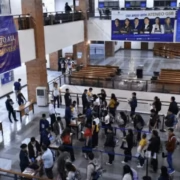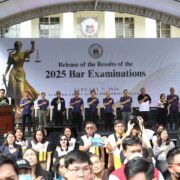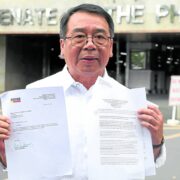Weaponizing ‘forthwith’ to ditch VP’s trial

Is Senate President Chiz Escudero using the word “forthwith” to justify his delaying tactics in convening the Senate as an impeachment court?
In several press briefings and interviews, Escudero has repeatedly said that the Senate needs to follow “due process” and other considerations before they can start the impeachment trial of Vice President Sara Duterte. He explained that the Senate as a whole need to hear various manifestations of disagreement on this. He was quite emphatic that a serious case like the impeachment of a top government official needs a lot of time to listen to various arguments for and against it.
But isn’t an impeachment trial the appropriate venue to hear all these arguments? The trial must be held “forthwith” as the Constitution says, because it is proof that we are in a democracy, not an aristocracy. We have a Constitution that prescribes what to do when the articles of impeachment are submitted to the highest legislative body, and upon receipt of such papers, the Senate, which is mandated to convene as an impeachment court, must do so “forthwith,” or immediately.
The impeachment trial is also a sign that despite all the deficiencies in our political and governance system, the Philippines is still a government run by the rule of law—not the rule of its rulers, even if they are the senate president or the president himself. The general public deserves to be aware that this is how the government is run, not through the whims and caprices of those who are in power. An impeachment trial will demonstrate this—that no one is above the law, that high officials must accede to what the basic law of the land says, and not to one person’s way of weaponizing the word “forthwith” to delay the conduct of the impeachment process.
More importantly, holding the impeachment trial will restore civic trust in our political institutions. Our recent political history has shown that such trust has eroded over time, when political dynasties—both fat and deep—have made the government the playground of the rich, and the poor as a burden to governance. Our legislators, many of whom are part of these fat and deep political dynasties, are only concerned about how to preserve their grip on political power, behaving as if they own government resources.
Yesterday, June 9, marked the start of the three-day protest of progressive party list Akbayan members and other party list groups that are aggressively pushing for the immediate conduct of the impeachment trial of Vice President Sara Duterte. Activist party list groups like Akbayan and ML are not the only ones pushing for VP Duterte’s impeachment trial to be done “forthwith” as provided in the 1987 Philippine Constitution. Almost all heads or deans of colleges of law in different state and private institutions of higher learning in Metro Manila have issued statements urging the Senate to perform a constitutionally mandated function—organizing itself as an impeachment court.
This protest group might soon gather more sympathizers, as there is already strong public opinion in favor of pushing the impeachment trial. Seeing them milling around the facade of the Senate building brought back memories of a previous impeachment trial that did not happen–that of former president Joseph “Erap” Estrada. Because the Senate at that time delayed and refused to read the contents of the envelope that contained integral documents in the articles of impeachment, there was no impeachment trial. Instead, a crowd rallied around the Edsa shrine and called for the ouster of the former president.
Erap’s ouster in 2001 made Vice President Gloria Macapagal succeed to the presidency, making her assume the last three years of Erap’s term. This is why she is the only Philippine president to have stayed in office longer than the prescribed six-year term.
Several legal luminaries, including a former member of the Supreme Court, Adolf Azcuna, have clarified the meaning of “forthwith.” He said he is among the framers of the provision on creating an impeachment court in the country’s highest lawmaking body, the Senate. He explained that as soon as the articles of impeachment are forwarded by the majority of the members of the House of Representatives, the Senate is bound to act on these “forthwith.” Azcuna even translated the term into Tagalog—it means agad-agad or immediately.
As a top government official and a lawyer, Escudero knows very well the meaning of the word “forthwith.” But, as usual, he is playing political games—weaponizing a key term in the constitutional provision on when the Senate should be convened as an impeachment court.


















How to help the world’s poor most effectively